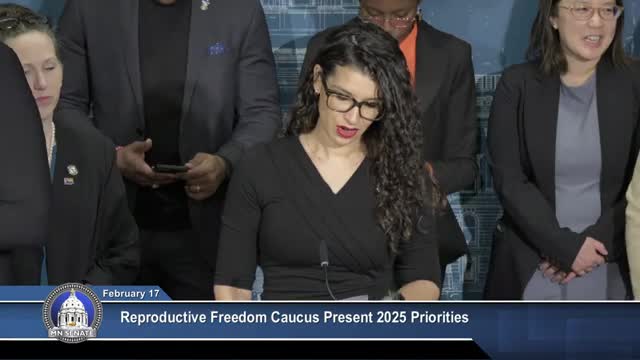Reproductive Freedom Caucus vows to defend Minnesota rights as federal, state threats grow
Get AI-powered insights, summaries, and transcripts
Subscribe
Summary
Caucus leaders urged protection of recent Minnesota reproductive laws, warned a federal Comstock Act enforcement or other measures could curtail care, and outlined state-level priorities including the Equal Rights Amendment and opposing bills they say target trans people and abortion access.
The Reproductive Freedom Caucus, led by Sen. Erin Maye Quade and Rep. Lee Finke, said Tuesday it will work to protect the reproductive laws passed in recent legislative sessions and warned that federal actions and new state bills could reduce access to abortion and related care in Minnesota.
The caucus leaders spoke at a press event to outline priorities including a state-level push for the Equal Rights Amendment, defending the Protect Reproductive Options Act of 2023, opposing several Republican-sponsored bills they say would restrict care for pregnant people and trans students, and pressing for restoration of federal research funding they say has been frozen.
Why it matters: caucus leaders said federal enforcement of long-dormant statutes and reductions in federal research funding could have immediate effects on clinical care and access in Minnesota, while bills introduced in the Minnesota Legislature could roll back protections adopted over the last two years.
Sen. Erin Maye Quade, co-chair of the caucus, flagged one specific federal risk: enforcement of the Comstock Act, a 19th‑century federal statute she said could be used to restrict mailing of abortion-related drugs and equipment. "Can we still mail medication abortion to people? Can we still mail speculums and things that are used for pap smears or delivering children?" Quade asked, saying the state cannot stop enforcement of a national law. "Enforcement of Comstock is corporate in nature ... the state of Minnesota cannot stop a national abortion ban," she said.
Quade also recited data she attributed to national trends since the 2022 Supreme Court decision overturning Roe v. Wade, saying "infant mortality jump[ed] 6 percent in this country" and that states such as Texas have seen higher increases; she added that the increases for Black children have been larger.
Sen. Liz Bolden, who said she represents much of Rochester, tied recent federal funding actions to clinical impacts. "The recent freeze on NIH funding imposed by the Trump administration is not merely a budgetary decision. It is a deliberate assault on reproductive health care," Bolden said, adding that the pause has led to suspension of programs and limited access to promising treatments for conditions that can complicate pregnancy.
Rep. Esther Agbaje, who said she represents North Minneapolis and downtown Minneapolis, emphasized racial disparities in pregnancy outcomes. "Black women continue to face disparities in reproductive health care," Agbaje said, citing that Black Minnesotans make up 13 percent of the birthing population but account for roughly 23 percent of pregnancy-associated deaths in the state and that national data show many pregnancy-related deaths are preventable.
Several caucus members criticized bills filed by Republicans. Rep. Carly Catiza Wootun, who described herself as author of the Protect Reproductive Options Act of 2023, said House File 24 — which she said the Republican-led House Health Committee heard last week — would require physicians to "utilize life-saving measures on infants delivered alive as a result of a pregnancy termination," and would prevent parents from holding and comforting a newborn diagnosed as nonviable. "This bill would prohibit parents from holding and comforting their terminal newborn with the few moments of life that they have together," she said.
Rep. Andy Smith said he was raising the broader threat of "Christian nationalism," which he described as a political effort to impose a particular religious view on public life. Smith said several bills — which the caucus referenced as House Files 12 and 19 and versions of 24 and 25 — reflect that movement and would, in the caucus's view, bar transgender students from sports or restrooms and divert public education dollars into private, often religious, institutions.
The caucus said it will pursue a "whole‑of‑government" strategy to defend state laws, naming Attorney General Keith Ellison as a partner in litigation and legal defense. "We have laws. We had the most historic legislative success we have ever seen in the past biennium and those laws stand and we will defend them," a caucus member said.
Members also signaled a continued push for a state Equal Rights Amendment. "I am honored to be carrying the Equal Rights Amendment constitutional amendment bill in the legislature this year," Rep. Lee Finke said, adding that the version introduced in the House is "protective of our reproductive freedoms, inclusive of our trans community and intersex community."
The caucus warned that many of the bills it opposes have already prompted hearings; speakers said they expect repeated floor debates and court challenges. When asked how Minnesota legislators could respond if a federal law like Comstock were enforced, Quade said the effect would depend on how broadly federal authorities interpreted and enforced the statute and reiterated that the state has limited ability to block national enforcement.
The event included several rounds of questions from unnamed reporters and advocates. Caucus leaders repeated that their strategy will include legal defense, legislative work to strengthen protections, and public outreach.
Members closed by urging continued vigilance: "We are building a future that does not yet exist, where everyone is loved and is able to access peace and health care, and we will do everything we can in that work," one caucus leader said.
Ending: The caucus did not announce specific new legislation at the event; its members said they will continue to file and defend bills in the coming weeks and coordinate with state legal officials on litigation as needed.
